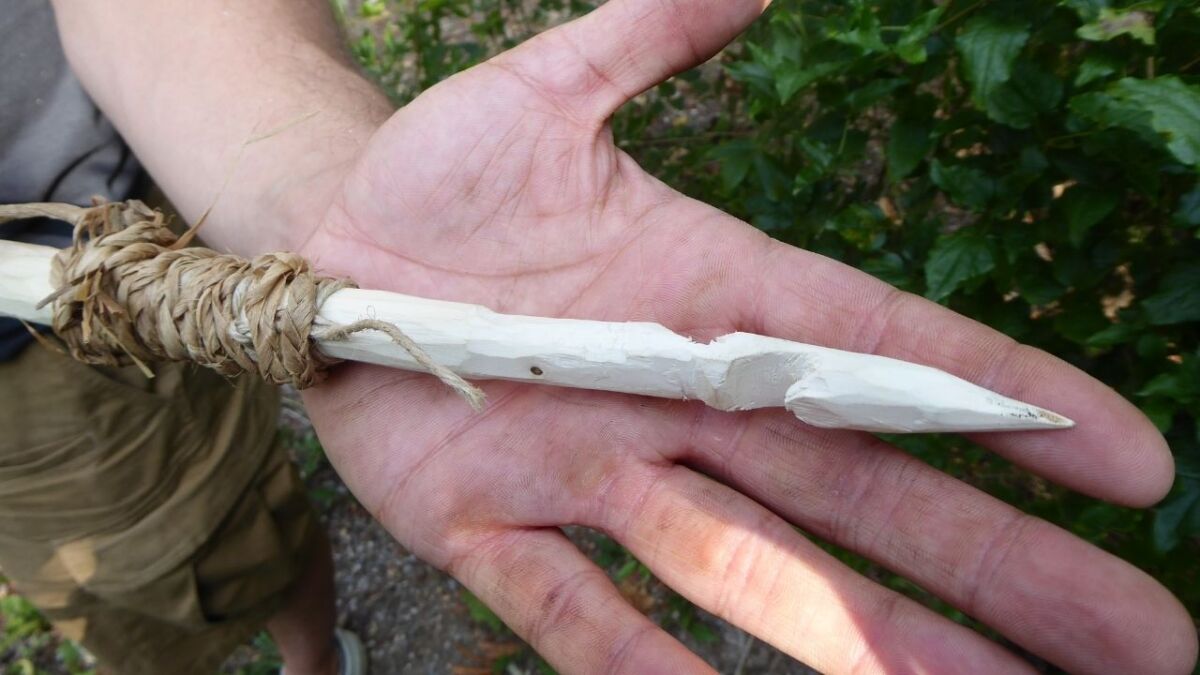
Spearfishing
Noun
Meaning
Spearfishing is a technique used in the outdoor world, specifically in the realm of survival, bushcraft, and wilderness activities. It involves using a spear or a similar tool to catch fish underwater. Spearfishing requires a combination of skill, patience, and knowledge of the aquatic environment. It is a popular method for obtaining food while camping, hiking, or exploring remote areas. Spearfishing allows you to connect with nature, test your hunting abilities, and provide sustenance in the great outdoors. It is an exciting and challenging activity that adds an element of adventure to your outdoor experience.

Examples
„I love spearfishing because it combines my passion for the ocean with my love for hunting.“
„Spearfishing requires a lot of skill and patience, but the feeling of catching a fish with just a spear is incredibly rewarding.“
„When I go spearfishing, I always make sure to bring my snorkel and fins to help me swim faster and dive deeper.“
„Spearfishing is not only a great way to catch food, but it also allows me to connect with nature and appreciate the underwater world.“
„One of the most important things to remember when spearfishing is to always respect the environment and only take what you need.“
Origin
Spearfishing is a term that originated from the combination of two words: "spear" and "fishing". The word "spear" refers to a long, pointed weapon used for hunting or fishing, while "fishing" is the act of catching fish. Spearfishing, therefore, is the practice of using a spear to hunt fish underwater.
The roots of spearfishing can be traced back to ancient times when humans first discovered the underwater world and realized the abundance of food it offered. Early civilizations, such as the ancient Greeks and Romans, used primitive spears and harpoons to catch fish for sustenance.
Over time, spearfishing evolved and became more sophisticated. In the 20th century, the invention of rubber-powered spearguns revolutionized the sport, allowing divers to shoot their spears with greater accuracy and force. This advancement made spearfishing more accessible and popular among recreational divers.
Today, spearfishing is practiced worldwide, both as a recreational activity and as a means of subsistence in some coastal communities. It requires a combination of skill, knowledge of marine ecosystems, and respect for sustainable fishing practices.
Synonyms
Spearfishing, Underwater hunting, Harpoon fishing, Free diving fishing, Pole spear fishing, Breath-hold fishing, Underwater spearfishing, Underwater stalking
Antonyms
Hunting, Trapping, Land-based fishing, Foraging, Gathering, Farming, Agriculture, Gardening
Relatives
Hunting, Fishing, Underwater, Snorkeling, Marine life, Spear, Harpoon, Breath-hold diving
Historical and cultural importance
Spearfishing has a long history and cultural significance in many coastal communities around the world. It is a traditional method of fishing that dates back thousands of years and has been practiced by indigenous peoples in various regions.
In ancient times, spearfishing was essential for survival, providing communities with a reliable source of food. It required skill, patience, and knowledge of the underwater environment. Spearfishing techniques varied depending on the location and available resources, with different cultures developing their own unique methods.
For example, the Ama divers of Japan have been practicing spearfishing for centuries. These female divers would free-dive without any breathing apparatus, using long spears to catch fish and shellfish. Their diving skills and knowledge of the sea were passed down through generations, creating a rich cultural tradition.
In Polynesia, spearfishing was not only a means of sustenance but also a sport and a way to demonstrate bravery and skill. The Maori people of New Zealand, known for their warrior culture, used spears to hunt fish in rivers and coastal waters. Spearfishing was not only a practical activity but also a way to connect with their ancestral traditions and honor their cultural heritage.
Today, spearfishing continues to be practiced as a recreational activity and a way to connect with nature. It requires a deep understanding of marine ecosystems, as well as the ability to hold one's breath and dive to significant depths. Spearfishing enthusiasts often emphasize the importance of sustainable fishing practices and conservation efforts to ensure the long-term health of marine life.
More information about the term Spearfishing
What is Spearfishing?
Spearfishing is a thrilling and ancient method of fishing that involves using a specialized spear or pole to catch fish underwater. It is a combination of hunting and fishing, as it requires stealth, precision, and knowledge of the marine environment.
The Equipment
To engage in spearfishing, you will need a few essential pieces of equipment. The most important tool is the spear gun, which is used to propel the spear towards the fish. There are different types of spear guns, including pneumatic, band-powered, and sling-powered guns. You will also need a snorkel, mask, and fins to help you navigate underwater and observe the fish. Additionally, a wetsuit or dive skin is necessary to protect your body from the cold water and potential scrapes or stings.
Techniques and Safety
Spearfishing requires a combination of physical skill, knowledge of fish behavior, and respect for the marine environment. It is important to practice proper breath-holding techniques and to be comfortable diving to various depths. Safety is paramount, and it is crucial to always dive with a buddy and to have a dive flag or buoy to signal your presence to other watercraft.
Benefits of Spearfishing
Spearfishing offers a unique and immersive experience in the underwater world. It allows you to connect with nature, observe marine life up close, and provide a sustainable source of food. Spearfishing also promotes physical fitness, as it requires swimming, diving, and breath-holding. It can be a challenging and rewarding activity that tests your skills and patience.
Conservation and Ethics
As spearfishing involves targeting specific fish, it is important to practice responsible fishing practices and adhere to local regulations. It is crucial to only target legal-sized fish and to avoid overfishing or damaging the marine ecosystem. Spearfishers should also be aware of protected species and marine reserves, respecting their boundaries and not disturbing their habitats.
Conclusion
Spearfishing is an exciting and ancient method of fishing that combines hunting and fishing skills. It offers a unique opportunity to explore the underwater world, connect with nature, and provide a sustainable source of food. However, it is important to approach spearfishing with respect for the marine environment and to practice responsible fishing practices. By doing so, you can enjoy the thrill of spearfishing while ensuring the long-term health and conservation of our oceans.
Back to overview

